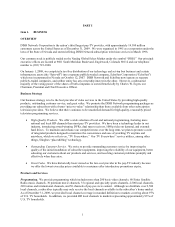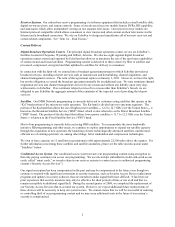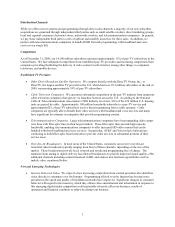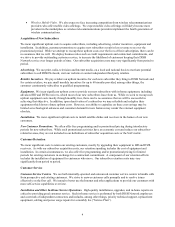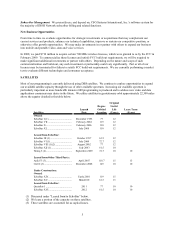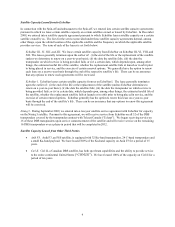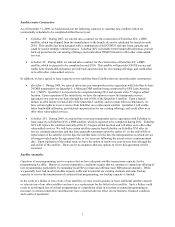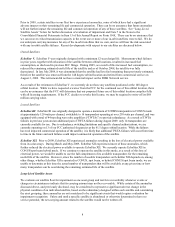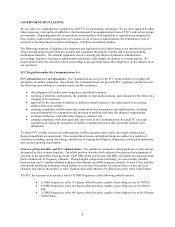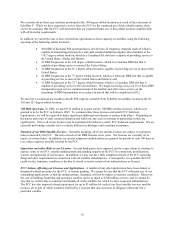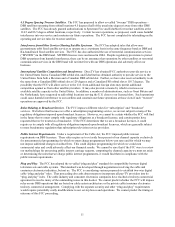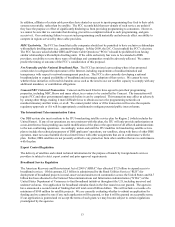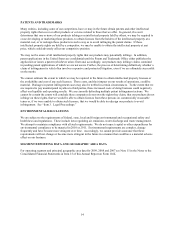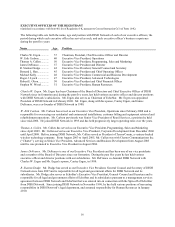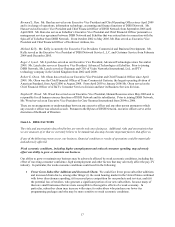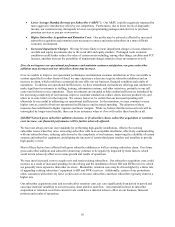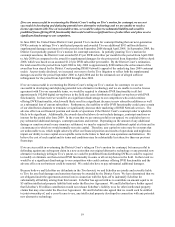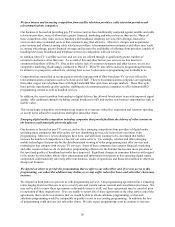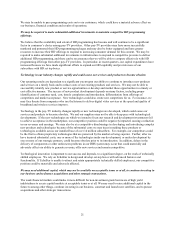Dish Network 2009 Annual Report Download - page 21
Download and view the complete annual report
Please find page 21 of the 2009 Dish Network annual report below. You can navigate through the pages in the report by either clicking on the pages listed below, or by using the keyword search tool below to find specific information within the annual report.
11
4.5 Degree Spacing Tweener Satellites. The FCC has proposed to allow so-called “tweener” DBS operations –
DBS satellites operating from orbital locations 4.5 degrees (half of the usual nine degrees) away from other DBS
satellites. The FCC has already granted authorizations to Spectrum Five and EchoStar for tweener satellites at the
114.5 and 86.5 degree orbital locations, respectively. Certain tweener operations, as proposed, could cause harmful
interference into our service and constrain our future operations. The FCC has not completed its rulemaking on the
operating and service rules for tweener satellites.
Interference from Other Services Sharing Satellite Spectrum. The FCC has adopted rules that allow non-
geostationary orbit fixed satellite services to operate on a co-primary basis in the same frequency band as DBS and
Ku-band-based fixed satellite services. The FCC has also authorized the use of terrestrial communication services
(“MVDDS”) in the DBS band. MVDDS licenses were auctioned in 2004. Despite regulatory provisions to protect
DBS operations from harmful interference, there can be no assurance that operations by other satellites or terrestrial
communication services in the DBS band will not interfere with our DBS operations and adversely affect our
business.
International Satellite Competition and Interference. DirecTV has obtained FCC authority to provide service to
the United States from a Canadian DBS orbital slot, and EchoStar has obtained authority to provide service to the
United States from both a Mexican and a Canadian DBS orbital slot. Further, we have also received authority to do
the same from a Canadian DBS orbital slot at 129 degrees and a Canadian FSS orbital slot at 118.7 degrees. The
possibility that the FCC will allow service to the U.S. from additional foreign slots may permit additional
competition against us from other satellite providers. It may also provide a means by which to increase our
available satellite capacity in the United States. In addition, a number of administrations, such as Great Britain and
the Netherlands, have requested to add orbital locations serving the U.S. close to our licensed slots. Such operations
could cause harmful interference to our satellites and constrain our future operations at those slots if such “tweener”
operations are approved by the FCC.
Rules Relating to Broadcast Services. The FCC imposes different rules for “subscription” and “broadcast”
services. We believe that because we offer a subscription programming service, we are not subject to many of the
regulatory obligations imposed upon broadcast licensees. However, we cannot be certain whether the FCC will find
in the future that we must comply with regulatory obligations as a broadcast licensee, and certain parties have
requested that we be treated as a broadcaster. If the FCC determines that we are a broadcast licensee, it could
require us to comply with all regulatory obligations imposed upon broadcast licensees, which are generally subject
to more burdensome regulation than subscription television service providers.
Public Interest Requirements. Under a requirement of the Cable Act, the FCC imposed public interest
requirements on DBS licensees. These rules require us to set aside four percent of our channel capacity exclusively
for noncommercial programming for which we must charge programmers below-cost rates and for which we may
not impose additional charges on subscribers. This could displace programming for which we could earn
commercial rates and could adversely affect our financial results. We cannot be sure that if the FCC were to review
our methodology for processing public interest carriage requests, computing the channel capacity we must set aside
or determining the rates that we charge public interest programmers, it would find them in compliance with the
public interest requirements.
Plug and Play. The FCC has adopted the so-called “plug and play” standard for compatibility between digital
television sets and cable systems. That standard was developed through negotiations involving the cable and
consumer electronics industries, but not us. The FCC is considering various proposals to establish two-way digital
cable “plug and play” rules. That proceeding also asks about means to incorporate all pay-TV providers into its
“plug and play” rules. The cable industry and consumer electronics companies have reached a tru2way commercial
agreement to resolve many of the outstanding issues in this docket. We cannot predict whether the FCC will impose
rules on our DBS operations that are based on cable system architecture or the private cable/consumer electronics
tru2way commercial arrangement. Complying with the separate security and other “plug and play” requirements
would require potentially costly modifications to our set-top boxes and operations. We cannot predict the timing or
outcome of this FCC proceeding.


